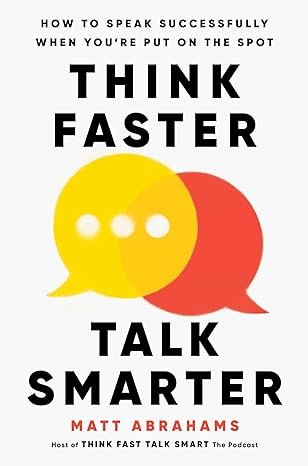What is Loyalty?
Photo by Stephen Andrews on Unsplash
Today's second topic is a book review of Think Faster, Talk Smarter: How to Speak Successfully When You're Put on the Spot by Matt Abrahams.
Word Count: About 1,200 words, with an approximate reading time of 4 to 6 minutes. Please share your thoughts in the comments.
Please be kind enough to follow and subscribe on Medium or LinkedIn.
Links to purchase the books discussed in this newsletter can be found on my website's recommended reading page.
Since the end of the pandemic, many employment trends have emerged. These include the great resignation, quiet quitting, over-employment, and the rise of side hustles. Many articles explore ways for companies to increase employee loyalty.
All of these articles fail to recognize an essential element of loyalty. Loyalty is reciprocal. Loyalty is hard to earn and very easy to lose. Loyalty is demonstrated in both thought and action. It exists when the interests of the employee and employer are aligned. Loyalty is a mutual agreement.
Employers fail to realize that loyalty is an emotional commitment. When companies work to create camaraderie and build teams, they are asking people to make intellectual and personal commitments. It is important to recognize that these commitments are conditional. Allegiance to work is secondary. Employees ultimately work to provide for themselves and their families.
Loyalty is easily lost. Every time a company has a layoff, trust and loyalty are lost. These decisions are often justified by statements like "This is a difficult business decision." Think of the Godfather's Michael Corleone saying, "It's not personal, Sonny. It's strictly business."
A quote from You've Got Mail best exemplifies the emotional nature of corporate loyalty and the reality that business decisions affect personal lives in profound ways.
Kathleen Kelly (Meg Ryan) - What is that supposed to mean? I am so sick of that. All that means is that it wasn't personal to you. But it was personal to me. It's personal to a lot of people.
Related Articles
What I got wrong about loyalty at work (Business Insider)
Research Says 80 Percent of Employees Are Treated Unfairly. Here Are 3 Ways to Instantly Change That (Inc.) – Note that this article fails to define unfairly.
Is Workplace Loyalty Gone for Good? (Wharton)
What Does Employee Loyalty Look Like Today? (Forbes)
Loyalty is Reciprocal (Peter Leppik)
Why Is Loyalty So Important? (Verywell Mind)
Book review of Think Faster, Talk Smarter: How to Speak Successfully When You're Put on the Spot by Matt Abrahams
Leaders must be able to communicate their vision to be successful effectively. Perhaps the most difficult situations are when we are asked to present without the ability to prepare in advance. The impromptu response offers the opportunity for great success and total disaster. These responses are seen as genuine and reflective of your capabilities. Good responses inspire confidence. Missteps result in uncertainty and doubt.
Think Faster, Talk Smaller offers six structures that can be used in various situations. Mr. Abrahams also provides specific examples and advice for identifying what structure(s) to use in different circumstances. There are times when we can anticipate what will be asked. After giving a presentation, you can anticipate some of the audience's questions and prepare talking points for your response. Your responses cannot be scripted because they need to adapt to the context of the questions that came before and the audience dynamic of the day.
I would describe the structures presented in the book as mental models. Mental models enable us to assess a situation and identify a pattern to use to move forward. Mental models are simplified views of how things work that are used as a framework to organize the unique information of the moment.
The commitment required is to internalize these structures so that you can call on them without hesitation.
Mr. Abrahams teaches at Stanford University. For quite some time, Stanford has recognized the power of improvisation. Courses and lectures are shared between the Department of Theater and Performance Studies, the Graduate School of Business, and other departments to teach everyone improvisation.
What I'm Up To
Other than watching the Super Bowl, not much is going on. I was cheering for the Detroit Lions in the championship game because they have never been. Knowing how I feel about the Texas Rangers, I understand the emotions of their fans.
I use several websites for the royalty-free images I use in my newsletters. When choosing the cover image for this edition, I searched for pictures with the keyword loyalty. Dogs dominated the result. Dogs are great representatives. We lost our quirky and loyal dog a few months ago.
Chips and Salsa: Snack-sized news and posts
It is dangerous to toss around medical diagnoses when talking about the workplace. Some people demonstrate many of the narcissistic behaviors described in this article who do not have a narcissistic personality disorder. Just because they are not clinical does not mean they are any easier to be around.
A Reflection on Self-Love. Personal Perspective: Narcissus reconsidered. (Psychology Today)
Choose to live in the real world. It will always be more interesting and enjoyable. You have to work for it.
The Vision Pro's scary side effect (Business Insider)
When interviewing, remember it is a two-way activity. Companies are looking at you. You need to look at the company. The subject of this article showed remarkable awareness of the candidate to see the thorns on the rose.
This article tries to show people how to be unethical. They accept a job with pay and working conditions. They quickly find a way not to perform according to the agreement.
A Millennial Explains How He Makes Over $250,000 Secretly Working 2 Remote Jobs (Entrepreneur)
More on the changing nature of work, a topic in my last newsletter.
How Data Busts Myths About The 4-Day Work Week (Forbes)
Stay sharp!
People who stay mentally sharp in their retirement usually adopt these 5 daily habits (HackSpirit)
Be content rather than happy.
Groundbreaking Research From Yale and Berkeley Find That the Good Life Isn't About Happiness (Inc.)
Language translation cuts in many ways. This article explores Japanese words that do not exist in English. When traveling in South Korea, I noticed small business signs were all in Hangul except for one word – Fax. Part of what makes global communication so difficult is the mapping. Japanese maps to English are different from Spanish or German.
How Languages Divide the World (Medium)
Setting boundaries is essential. Respecting the boundaries others set is just as important. Conflicts arise when boundaries overlap. A good analogy is border disputes between countries when both claim historical or cultural history.
How to Set Healthy Boundaries & Build Positive Relationships (Medium)
In many cases, self-medication is used to avoid the hard work to address the root cause of the anxiety we feel.
Scientists say the cannabis people are using for anxiety could be making it worse (Fast Company)
Analogies, metaphors, and idioms are essential communication tools. But if used too much, the message is lost. The more global and diverse the audience, the harder it is to use them well.
Boring Communicators Can Teach Us a Lot About Public Speaking (Medium)
Quotes
“Nothing important, or meaningful, or beautiful, or interesting, or great ever came out of imitations.”
- Anna Quindlen
“Success is not forever and failure isn't fatal.”
- Don Shula
“Excellence is to do a common thing in an uncommon way.”
- Booker T. Washington
You can order The Leader With A Thousand Faces on the Recommended Reading Page of my website.
My goal is to make this newsletter as interesting and valuable as possible. Please share your thoughts and suggestions for improvement. If there are specific topics in leadership you would like me to focus on in future issues, please send them my way.
You can follow this newsletter on either LinkedIn or Medium.




